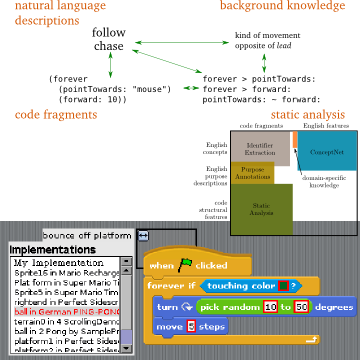About Me
Some say, how can computers ever be intelligent if they're just following instructions? I suggest we take that question seriously. For a machine to be broadly intelligent, it must not just use the instructions and reasoning processes that its designers gave it, but plan, adapt, and evaluate new or repurposed processes. The result will be machines that are more flexible, less stupid, and much more helpful parts of our lives.
I am exploring intelligent systems from several angles. My Masters' thesis (ProcedureSpace) at the MIT Media Lab was about relating ambiguous statements of goals with concrete fragments of code that might accomplish them. I've also worked with helping computers understand how concepts relate to each other using flexible, imprecise reasoning processes (commonsense).
I used to work in the Media Lab with the Software Agents / Commonsense Computing group.
Projects
Informal Programming [Master's Thesis]

Computers usually require us to be precise about what we want them to do and how, but humans find it hard to be so formal. But if we gave computers formal examples of our informal instructions, maybe they could learn to relate ordinary users' natural instructions with the specifications, code, and tests that they are comfortable with. As an example of this idea, we present Zones and ProcedureSpace. Zones is a code search interface that connects code with comments about its purpose. Completed searches become annotations, so the system learns by example. The backend, called ProcedureSpace, finds code for a purpose comment (or vice versa) by relating words and phrases to code characteristics and natural language background knowledge. When we let a few people try out the system, they were able describe what they wanted in their own words and often found that the system gave them helpful code.
Position Paper (5 pages) | Slides
Technical Paper (8 pages) | Slides
Masters Thesis (105 pages)
Common Sense Computing Initiative
Humans understand new information by reference to a large and rich body of background knowledge and metaknowledge. I work with the Common Sense Computing Initiative to develop techniques to learn and use this knowledge.
I am a lead developer of Divisi, a library for reasoning by dimensionality reduction over a wide variety of knowledge sources. I also contribute to many other projects, including:
- Open Mind Commons, a community website for collecting, rating and browsing commonsense knowledge
- ConceptNet, a multilingual semantic network of natural language commonsense knowledge
- Luminoso, an interactive exploratory interface for semantic opinion mining
- TwitterMap, a real-time opinion map using streaming dimensionality reduction
Arnold, K.C. and H. Lieberman. Scruffy Cross-Domain Inference. AAAI Fall Symposium on Common Sense Knowledge, November 2010. (Slides)
Others
I have other projects, in various stages of completion in the areas of artificial intelligence, human-computer interaction in software development, sound and music creation, audio analysis, educational technology, writing technology, scripture memorization, and gestural interfaces. Ask me if you're interested in more details.
Papers
- Gold, Kevin, Catherine Havasi, Michael Anderson, and Kenneth Arnold. Comparing Matrix Decomposition Methods for Meta-analysis and Reconstruction of Cognitive Neuroscience Results, The 24th International FLAIRS Conference, May 2011
- Arnold, K.C. and H. Lieberman. Scruffy Cross-Domain Inference. AAAI Fall Symposium on Common Sense Knowledge, November 2010. (Slides)
- Arnold, K.C. and H. Lieberman. Embracing Ambiguity. Workshop on the Future of Software Engineering Research, November 2010. (Slides)
- Arnold, K.C. and H. Lieberman. Managing Ambiguity in Programming by Finding Unambiguous Examples. Onward! October 2010.
- Arnold, K.C. Reusing Code by Reasoning About its Purpose. Master's thesis, MIT, February 2010.
- Alonso, J.B., K.C. Arnold, and C. Havasi. Envisioning a Robust, Scalable Metacognitive Architecture Built on Dimensionality Reduction. In AAAI-10 Workshop on Metacognition for Robust Social Systems, July 2010. (Slides)
- Speer, R., J. Krishnamurthy, C. Havasi, D. Smith, H. Lieberman, K.C. Arnold. An interface for targeted collection of common sense knowledge using a mixture model. Proceedings of the 13th International Conference on Intelligent User Interfaces (IUI), February 2009.
- Smith, D. and K.C. Arnold. Learning hierarchical plans by reading simple English narratives. Presented at the Commonsense Workshop at the ACM International Conference on Intelligent User Interfaces (IUI), February 2009.
Friends and Groups
At Harvard CS, I work with:
- Krzysztof Gajos (PhD advisor)
- Steve Komarov
- Pao Siangliulue
- Anna Huang
- Katharina Reinecke
At the MIT Media Lab, I worked with:
- Henry Lieberman (Masters advisor)
- Catherine Havasi
- Rob Speer
- Jason Alonso
- Peggy Chi
- Dustin Smith
- and numerous undergraduate researchers, including Jesse Moeller, Andrew Farrell, Catherine Olson, Katie Thomas, Jess Lin, Nichole Treadway, and too many others to list.
I'm involved in various student groups, including the MIT Cross Products (Christian a cappella group) and Graduate Christian Fellowship. I sometimes also teach and help out with MIT's Educational Studies Program.
